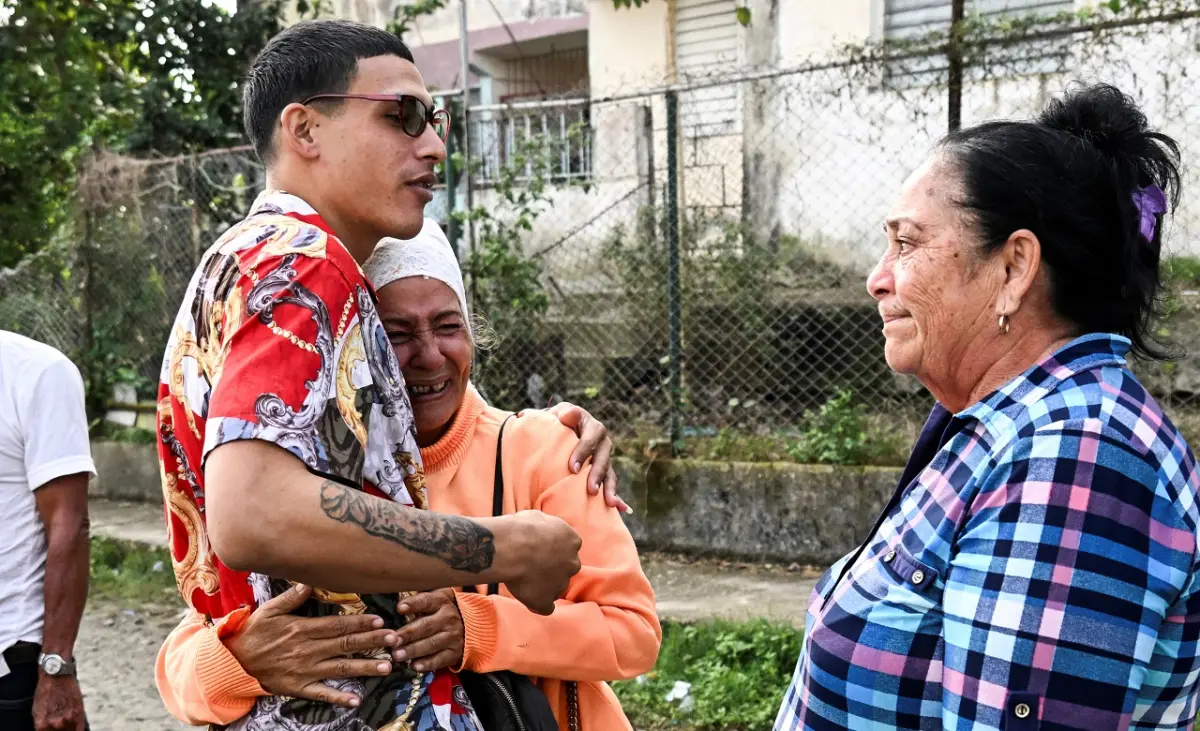
A total of 127 prisoners regained their freedom in Cuba, among them the opposition José Daniel Ferrer, as part of an agreement negotiated with the Catholic Church after the island’s withdrawal from the US blacklist of countries that support terrorism.
(Also read: Colombia’s role in the United States’ decision to remove Cuba from the terrorism list)
“Between Wednesday and Thursday, 127 early releases have been granted, of which 121 for conditional release and six for extra-penal license,” said Maricela Sosa, vice president of the Supreme People’s Court, on Thursday. The “extrapenal license” is an early release permit granted by the courts mainly for health reasons.
It is the first official figure released by the authorities since the announcement on Tuesday of a negotiated agreement, with the help of the Catholic Church, for the release of 553 prisoners.
On Tuesday, the Cuban government pledged to release these prisoners after the president of the United States, Joe Bidensurprisingly announced the island’s removal from the black list of countries sponsoring terrorism, which includes North Korea, Iran and Syria.
“We have it at home”
Among the 127 released are: José Daniel Ferrer, 54 years old, who was in the Mar Verde prison, in the province of Santiago de Cuba (east). “We just arrived with him. Thank God we already have him at home,” his wife Nelva Ortega told AFP by telephone.
Shortly after, Ferrer called on Cubans not to be “afraid to confront” the communist government, because “it is increasingly more scared” and “weaker,” according to statements to the anti-Castro radio station Martí Noticias, based in Miami.
“Do not be afraid of fight for a free Cuba“nor” to work for a better future for all Cubans, so that we do not have to go in search of freedom and better living conditions to other lands,” added the opponent.
Declared a “prisoner of conscience” by Amnesty International in 2021, Ferrer was arrested when he tried to join the demonstrations on July 11, 2021 (J-11), the largest recorded on the island since the triumph of the revolution in 1959.
A month later, a court revoked the limited freedom sentence he was serving and he was returned to prison to complete the original sentence of four years and six months that he received in 2020 on charges of injuries and other crimes against another opponent, which he denies.
Ferrer was part of the group of 75 prisoners of the so-called Black Spring of 2003, the largest wave of repression launched against the opposition under the government of Fidel Castro. He was then sentenced to 25 years in prison and released in 2011 through the intermediation of the Catholic Church. He was one of the members of that group who declined to go into exile in exchange for his release.
YAMIL LAGE/AFP
(Also read: Murillo for the decision to remove Cuba from the list of countries that promote terrorism: “A fair measure”)
“New beginning” in Cuba
The vast majority of those released are protesters who were arrested for having participated in the protests of July 11 and 12known as 11-J.
“I’m not surprised by this trickle of prisoners” released, Michael Bustamante, an academic at the University of Florida, told AFP. Cuba “may be using the prisoners as chips at the negotiating table with the administration of Donald Trump,” which takes power on Monday, to “try to buy some time.”
Four prisoners, all convicted for their participation in 9/11, were released on Thursday from a prison located in San Miguel del Padrón, on the outskirts of Havana, AFP journalists reported. “Thanks to the fact that they gave me this opportunity again, again in life. It’s a new beginning,” the young man emotionally declared to AFP. Marlon Brando Diazwhich fulfilled a 18 year sentence for their participation in those protests.
Accompanied by their families like Díaz, three other prisoners who were serving their sentences in the same prison were released, AFP confirmed.
The Cuban authorities did not specify the dates of the releases nor did they publish a list of those who would benefit. There was also no official statement regarding this process.
According to official figures, some 500 Cubans were sentenced to up to 25 years in prison for participating in protests to demand more freedoms and economic improvements, but human rights organizations and the United States embassy on the island count up to 1,000. Some of those convicted were released after serving their sentences.
Cuba denies the existence of political prisoners and accuses opponents of being “mercenaries” of the United States.
Source: https://www.noticiascaracol.com/mundo/cuba-libera-a-127-prisioneros-tras-ser-retirado-de-paises-que-apoyan-el-terrorismo-cb20


